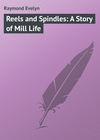Buch lesen: «Dorothy's House Party», Seite 9
CHAPTER XIV
AUNT BETTY TAKES A HAND
That picnic-supper! The fun of it must be imagined, not described. Sufficient to say that it was the merriest meal yet served in that great mansion; that all, including Mrs. Calvert, brought to it appetites which did not hesitate at “failures,” and found even Helena’s angel cake palatable, though Herbert did remark to his next neighbor:
“If they’d had that kind of leathery stuff instead of canvas to cover that circus tent it would never have broken through, never in the world!”
Not the least delighted of that company were the servants, who returned late from their outing, and had had to walk up the mountain from the Landing; they having lingered in the hill-city till the last possible train, which there were no local stages to meet.
“And to think that our Miss Dorothy had the kindness to get supper for us, too! Sure, she’s the bonniest, dearest lass ever lived out of old Ireland. Hungry, say you? Sure I could have et the two shoes off my feet, I was that starved! And to think of her and them others just waitin’ on us same’s if we was the family! Bless her! And now I’m that filled I feel at peace with all the world and patience enough to chase them naughty spalpeens to their bed! See at ’em! As wide awake now as the morn and it past nine of the night!” cried Norah, coming into the room where the twins were having a delightful battle with the best sofa cushions; Mrs. Calvert looking on with much amusement and as yet not informed who they were and why so at home at Deerhurst.
The chatter of tongues halted a little when, as the clock struck the half-hour, Mr. Seth came in. He looked very weary, but infinitely relieved at the unexpected return of the mistress of the house, and his greeting was most cordial. Indeed, there was something about it which suggested to the young guests that their elders might wish to be alone; so, one after another, they bade Mrs. Betty good-night and disappeared.
Dorothy, also, was for slipping quietly away, but Aunt Betty bade her remain; saying gently:
“We won’t sleep, my child, till we have cleared away all the clouds between us. As for you, Cousin Seth, what has so wearied you? Something more than chaperoning a lot of young folks to a circus, I fancy.”
“You’re right. The afternoon performance was a pleasure; the ride home a trial.”
“With whom did you ride?”
“Oliver Sands.”
“Indeed? How came – ”
“It’s a long story, Cousin Betty. Wouldn’t we better wait till morning?”
“Don’t you know how much curiosity I have? Do you want to keep me awake all night?” demanded the lady. But she believed that her old friend had some deep perplexity on his mind and that it would be a comfort to him to share it with her. “Is it something Dorothy may hear?”
“Certainly, if you wish. Already she knows part. Has she told you how the twins came here?”
“Somebody told, I forget who. All of the young folks talked at once, but I learned that they had been dropped on our premises, like a couple of kittens somebody wished to lose.”
“Exactly; and though he did not personally ‘drop’ them, the man who most heartily wishes to lose them is miller Oliver Sands. They are his most unwelcome grandchildren.”
“Why, Cousin Seth!” “Why, Master!” cried the hearers, amazed.
“True. Their mother was Rose Sands, whom her father always believed – or said – was ruined by the foolish name her mother gave her. His sons were like himself and are, I believe, good men enough, though tainted with their father’s hardness.”
“Hardness. That suave old Quaker! But you’re right, and I never liked him.”
“Nor I, I’m sorry to say, but I don’t wish to let that fact stand in the way of fair judgment. The man is in trouble, deep trouble. I’m not the only one who has noticed it. His behavior for awhile back has been most peculiar. He neglects his business, leaves the fruit in his vineyards and orchards to go to waste, and to his workmen’s question: ‘What shall we do next,’ returns no answer. He has taken to roaming about the country, calling at every house and inspecting each one and its surroundings as if he were looking for something he can’t find. His face has lost its perpetual smile – or smirk – and betrays the fact that he is an old man and a most unhappy one.”
“Huh! I’ve no great sympathy for Oliver Sands. He has wronged too many people,” said Mrs. Calvert, coldly. “But if those children are his grandchildren, what are they doing here?”
“I’m coming to that. His daughter, Rose, ‘married out of meeting,’ and against her father’s will. He turned her out of doors, forbade her mother ever to see or speak to her again, and though – being a Friend – he took no oath, his resolution to cast her off was equivalent to one. That part of my tale is common neighborhood gossip.”
“I never heard it,” said Mrs. Betty.
“No; such would scarcely be retailed to you. Well, Rose took refuge with her husband’s people, and all misfortune followed her flight from her father’s house. Her mother-in-law, her consumptive husband, and herself are dead; she passing away as the twins came into the world. The father-in-law, who was only a country-cobbler, but a profoundly religious man, became half-crazed by his troubles, and though I believe he honestly did his best by the babies left on his hands, they must have suffered much. They have never been so happy as now and I hope – ”
“Please, Mr. Seth, let me tell! Aunt Betty, if you’ll let me, I want to adopt Sapphira!”
“Adopt – Sapphira! You? A child yourself?”
“Yes, please. I’ll go without everything myself and I’d work, if I could, to earn money to do it. Molly is going to adopt Ananias. It will be lovely to have some object in life, and some the Seniors at the Rhinelander adopted some Chinese babies. True. They pay money each month, part of their allowance, to do it; so we thought – ”
But Aunt Betty was leaning back in her chair and laughing in a most disconcerting manner. It’s not easy to be enthusiastic on a subject that is ridiculed and Dorothy said no more. But if she were hurt by having her unselfish project thus lightly treated, she was made instantly glad by the tender way her guardian drew her close, and the gentle pat of the soft old hand on her own cheek.
“Oh! you child, you children! And I made the mistake of thinking you were as wise as a grown-up! We’ll attend to the ‘adoption’ case, by and by. Let Cousin Seth say his say now.”
“Well, finally, the old man, Hiram Bowen, forsook his old home, sold his few belongings and came here to our mountain. He must have had some sense left, and realized that he was not long for this world, because though until lately he has been unforgiving to Oliver Sands for the treatment of Rose, he now sought to interest her father on the little ones’ behalf. I’ve learned he made frequent visits to Heartsease, the Sands’ farm, but only once saw its owner. But he often saw Dorcas, the wife, and found her powerless to help him; besides, he did not mend matters, even with her, by explaining that he had named the twins as he had – ‘after her husband, and herself!’ He told her that she and Oliver were living liars, because the Scripture commanded Christians to look after their own households and they did not do so.”
“But how could her heart, the heart of any woman, remain hard against the sight of her orphan grandchildren?” demanded Mrs. Calvert, impatiently. “I’ve met that Dorcas Sands on the road, going to meeting with the miller, and she looked the very soul of meekness and gentleness.”
“So, I believe she is; but she never saw the children. I told you he was crazed, partially; and despite the fact that he felt their mother’s family should care for the orphans he did not want to give them up, permanently. He felt that in doing so he would be consigning them to a life of deceit and unscrupulousness.”
“How strange! And, Seth, how strange that you should know all this. It’s not many days since that old man ‘passed them on’ to us. You must have been busy gathering news,” commented Mrs. Betty.
“I have; but the most of it I learned this afternoon, when I was taking the fanatic to the Hospital. Dolly, you tell her about his harangue in the tent and what the twins did there. It will give a diversion to my thoughts, for it was funny!”
So Dolly told and they all laughed over the recital, and in the laughter both Mrs. Calvert and Dorothy lost the last bit of constraint that had remained in their manner whenever either chanced to remember the missing one hundred dollars and the sharpness of the telegram.
Mrs. Calvert resumed:
“You say, taking him to the Hospital. Have you done that, then? And how came you with Oliver Sands? The last man in the world to be drawn to Newburgh to see a circus.”
“Not the circus, of course, but the county fair. He got up enough interest in ordinary affairs to drive to the fair grounds to see his cattle safely housed. He will have, I presume, the finest exhibit of Holstein-Friesians on the grounds. He always has had, and has carried off many first premiums. He’s on the board of managers, too, and they had a business meeting at the Chairman’s, which is next door to St. Michael’s – the semi-private establishment where I took Bowen. He was just unhitching George Fox, to come home, as I stepped out of the Hospital grounds and met him.”
“So you asked him for a lift down?” asked Aunt Betty, smiling.
“No, I didn’t ask. He was so preoccupied, and I so full of what poor old Hiram had told me, that I just ‘natchally’ stepped into the rear seat without the formality of a request. Truly, I don’t think he even noticed me till we were well out of the city limits and on to the quiet back road. Then I asked: ‘How much will you pay, Friend Oliver, toward the support of Hiram Bowen at St. Michael’s Hospital?’
“Then he heard and noticed. Also, he tried to get rid of his passenger; but I wouldn’t be set down. He gave me a rather strong bit of his opinion on meddlers in general and myself in particular, and finding he had me on his hands for all the distance here he said not another word. It was ‘Quaker Meeting’ in good earnest; but I felt as if I were riding with a man of iron and – it tired me!”
“Oh, you dear Master! Did you have any supper?” suddenly demanded Dorothy, with compunction that she hadn’t thought of this earlier.
“Oh! yes. Some little girls were holding a sidewalk ‘fair’ for the benefit of the children’s ward and, while the authorities inside were arranging for Hiram’s bestowal, I bought out their stock in trade and we ate it all together. I do love children!”
Aunt Betty rose and turning to Dorothy, remarked:
“That should be a much better use for your money when you find it than adopting the grandchildren of a rich old Hardheart! Come, child, we must to bed; and to-morrow, we’ll take home the twins. ‘Pass them on’ to Heartsease.”
“Oh! must we? But, maybe, they won’t keep them there. Then, course, you wouldn’t leave them just anywhere, out of doors, would you? Besides, I don’t know what Molly will say. She’s perfectly devoted to her ‘son,’ ’Nias.”
“Do you not? Then I know very well what her Aunt Lucretia and his honor, the Judge, will say; I fancy that their remarks will have some weight! But I’m not hard-hearted, as you suggest, and we shall see what we shall see!” answered Aunt Betty, in her bright, whimsical way; adding as she bade Mr. Winters good-night and kissed Dorothy just as if no “cloud” had ever been between them:
“I am glad to be at home. I am so glad to come, even thus late to the House Party.”
And though she had said the misunderstanding that had made both herself and Dolly so unhappy “should be set right that very night,” maybe this was her way of “setting” it so.
Thus ended another Day of that Wonderful Week, but the morning proved rainy and dark.
“No day for going to the County Fair,” remarked Mrs. Calvert as she appeared among the young folks, just as they came trooping in to breakfast. “We must think of something else. What shall it be? Since I’ve invited myself to your Party I want to get some fun out of it!”
Helena thought she had never seen anything lovelier than this charming old lady, who moved as briskly as a girl and entered into their amusements like one; and when nobody answered her question she volunteered the suggestion:
“Charades? Or a little play in the big barn?”
“Just the thing; the charades, I mean. There would hardly be time for getting ready for a play, with parts to study and so on. We might plan that for Friday evening, our last one together. But do you, my dear, gather part of your friends about you and arrange the charades. Enough of us must be left for audience, you know. Well, Dorothy, what is it? You seem so anxious to speak?”
“Why not ‘character’ studies and make everybody guess. There’s that attic full of trunks I discovered one day. Surely they must be full of lovely things; and oh! it’s so jolly to ‘dress up’! Afterward, we might have a little dance in the barn – May we, may we?”
“Surely, we may! Dinah has the keys to the trunks, only I warn you – no carelessness. It’s one of my notions to preserve the costumes of the passing years and I wouldn’t like them injured. You may use anything you find, on the condition of being careful.”
That rainy day promised to be the merriest of all; and Dorothy had quite forgotten some unpleasant things, till, breakfast being over and most of the company disappearing in pursuit of Dinah and her keys to the treasure-trunks, Aunt Betty laid a detaining touch upon her arm and said:
“But you and I, my dear, will have a little talk in my room.”
Down went her happiness in a flash. The “misunderstanding” had not been passed by, then; and as yet there had been no “setting right.” Mrs. Calvert’s face was not stern, saying this, but the girl so thought. Indeed, had she known it, Aunt Betty shrank more from the interview and the reproof she must give than did the culprit herself. However, shrinking did no good, and immediately the Mistress had seated herself she began:
“What grieved me most was your suspicion of Ephraim. Dorothy, that man’s skin may be black but his soul is as white as a soul can be. He has served me ever since he was able to toddle and I have yet to find the first serious fault in him. The loss of the money was bad enough, and your scant value of it bad. Why, child, do you know whose money that was?”
“I – I thought it was – mine.”
“It was – God’s.”
“Aunt – Betty!” almost screamed Dorothy in the shock of this statement.
“Yes, my dear, I mean it. He has given me a great deal of wealth but it was His gift, only. Or, His loan, I might better call it. I have to give an account of my stewardship, and as you will inherit after me, so have you.”
For a moment the girl could not reply, she was so amazed by what she heard. Then she ventured to urge:
“You said you gave it to me for my House Party. How could it be like that, then?”
“So I did. I ‘passed it on,’ as poor Hiram Bowen did the twins. Then it became your responsibility. It was a trust fund for the happiness of others, and for their benefit. Why, just think, if you hadn’t been so careless of it, how much good it would have done even yesterday, for that very old man! Then dear Seth wouldn’t have had to tax his small income to pay for a stranger’s keep. Ah! believe me, my Cousin Seth spends money lavishly, but never unwisely, and always for others. When I said ‘dangerously angry’ I meant it. I am, in some respects, always in danger, physically. I shall pass out of your life quite suddenly, some day, my darling, but I do not wish to do so by your fault.
“Now, enough of lectures. Kiss me and tell me that hereafter you will hold your inheritance as a ‘trust,’ and I shall trust you again to the uttermost. Next I want you to go over every incident of that night when you mislaid the money and maybe I can hit upon some clue to its recovery.”
It was a very sober Dorothy who complied. It didn’t seem a very pleasant thing to be an heiress. She had found that out before, but this grave interview confirmed the knowledge; and though they discussed the subject long and critically, they were no nearer any solution of the mystery than when they began.
“Well, it is a strange and most uncomfortable thing. However, we can do no more at present, and I’d like you to take a little drive with me.”
“This morning, Aunt Betty, in all this rain? Ought you? Won’t you get that bronchitis again? Dinah – ”
“Dinah is an old fuss! She never has believed that I’m not soluble in water, like salt or sugar. Besides, I’m not going ‘in the rain,’ I’m going in the close carriage, along with you and the babies with the dreadful names. I’m going to have them renamed, if I can. Run along and put on your jacket. I think I’ve solved the riddle of my neighbor Oliver’s unhappiness and I’ll let no rain hinder me from making him glad again.”
“Dear Aunt Betty, will you do this for a man you do not like?”
“Of course. I’d do it for my worst enemy, if I knew – and maybe this poor miller is that. What ails that man is – remorse. He hasn’t done right but I’m going to give him the chance now, and see his round face fall into its old curves again.”
But good and unselfish as her mission was, for once the lady of Deerhurst’s judgment was mistaken.
CHAPTER XV
A MARVELOUS TALE AND ITS ENDING
Oliver Sands was shut up in his private office. It opened from another larger room that had once been tenanted but was now empty. The emptiness of the great chamber, with its small bed and simple furnishings, both attracted and repelled him, as was witnessed by the fact that he frequently rose and closed the door, only to rise again directly and open it again. Each time he did this he peered all about the big room, whose windows were screened by wire netting as well as by a row of spruce trees. These trees were trimmed in a peculiar manner and were often commented upon by passers along the road beyond. All the lower branches, to the height of the window-tops, were left to grow, luxuriantly, as nature had designed. But above that the tall trees were shaven almost bare, only sufficient branches being left to keep them alive. Also, beyond the trees and bordering the road was a high brick wall, presumably for the training of peach and other fruit trees, for such were carefully trained to it.
But the same wondering eyes which had noticed the trees had observed the wall, where indeed the fruit grew lusciously after a custom common enough in England but almost unknown in this region.
“Looks like both trees and wall were planned to let light into that side the house and keep eyes out. But, has been so ever since Heartsease was, and nothing different now.”
No, everything was outwardly unchanged, but his home was not like his home, that morning, when Mrs. Betty Calvert came to call. The rain that had kept him within had sent him to pass the hours of his imprisonment in his “den,” or office, and to the congenial occupation of looking over the cash in his strong box. He was too wise to keep much there, but there had been a time when the occupation had served to amuse the inmate of the big room, and he was thinking of her now.
Indeed, when there came a knock on the outer door he started, and quickly demanded: “Well?”
“Oliver, Betty Calvert, from Deerhurst, has called to see thee,” said the trembling voice of Dorcas.
“Why? What does she want?”
“To bring thee news. To bring thee a blessing, she says.”
“I will come.”
He rose and locked the strong box, inwardly resolving that its contents must be placed in the bank when next he drove to town, and he again carefully closed the door of the further room. But if there had been any to observe they would have seen his face grow eager with hope while his strong frame visibly trembled. He was not a superstitious man but he had dreamed of Deerhurst more than once of late and news from Deerhurst? A blessing, Dorcas said?
He entered the living-room, cast one eager glance around, and sat down. He had offered no salutation whatever to Mrs. Calvert and the gloom had returned to his face even more deeply. Dorcas was standing wringing her hands, smiling and weeping by turns, and gazing in a perfect ecstasy of eagerness upon Ananias and Sapphira, huddled against Dorothy’s knees. She held them close, as if fearing that cross old man would do them harm, but they were not at all abashed, either by him or by the novelty of the place.
“Well, Oliver Sands, you like plain speech and use it. So do I – on occasion. I have brought home your grandchildren, Rose’s children. Their grandfather on the other side has been committed to an institution and will give you no trouble. He ‘passed them on’ to my household and I, in turn, ‘pass them on,’ to yours, their rightful home. You will feel happier now. Good-morning.”
“What makes thee think he is unhappy?” ventured Dorcas, at last turning her eager gaze away from the twins.
“All the world sees that. He’s a changed man since last we met, and I suppose his conscience is troubling him on account of the way he treated Rose and her children. Their demented grandfather, on the other side, gave them horrible names. I’d change them if I were you. Good-morning.”
But if the miller had not sought to detain her nor responded to her farewell, Dorcas caught at her cloak and begged:
“Wait, wait! Oliver, does thee hear? Elisabeth Calvert is going. She is leaving Rose’s babies! What – what – shall I do? May I keep them here? Say it – Oliver speak, speak, quick! If thee does right in this thing mayhap the Lord will bless thee in the other! Oliver, Oliver!”
He shook her frail hand from his sleeve but he spoke the word she longed to hear, though the shadow on his face seemed rather to deepen than to lighten and astute Betty Calvert was non-plussed. She had so fully counted upon the fact that it was remorse concerning his treatment of his daughter which burdened him that she could not understand his increased somberness.
But he did speak, as he left the room, and the words his wife desired:
“Thee may do as thee likes.”
Then Mrs. Calvert, too, went out and Dorothy with her; strangely enough the twins making no effort to follow; in fact no effort toward anything except a pan of fresh cookies which stood upon the table! and with their fists full of these they submitted indifferently not only to the desertion of their friends but to the yearning embraces of their grandmother.
“Oh! what perfectly disgusting little creatures! Didn’t mind our leaving them with a stranger nor anything! Weren’t they horrid? And it didn’t make him look any happier, either, their coming.”
“No, they were not disgusting, simply natural. They’ve been half-starved most of their lives and food seems to them, just now, the highest good;” said Aunt Betty, as the carriage door was shut upon them and they set out for home. “I cannot call it a wasted morning, since that timid little woman was made glad and two homeless ones have come into their own. But – my guess was wide of the mark. It isn’t remorse ails my miller neighbor but some mystery still unsolved. Ah! me! And I thought I was beautifully helping Providence!”
“So you have, Aunt Betty. Course. Only how we shall miss those twins! Seems if I couldn’t bear to quite give ’Phira up. Deerhurst will be so lonesome!”
“Lonesome, child! with all you young folks in it? Then just imagine for an instant what Heartsease must have been to that poor wife. Shut up alone with such a glum, indifferent husband, in that big house. I saw no other person anywhere about, did you?”
“No, and, since you put it that way, of course I’m glad they’re to be hers not Molly’s and mine.”
“The queer thing is that he was so indifferent. I thought, I was prepared to have him rage and act – ugly, at my interference in his affairs; but he paid no more attention than if I had dropped a couple of puppies at his fireside. Hmm. Queer, queer! But if I’m not mistaken his young relatives will wake him up a bit before he’s done with them.”
After all, though Dorothy had hated to leave the other young folks on such an errand, through such weather, and in some fear of further “lectures,” the ride to Heartsease had proved delightful. She wouldn’t have missed the rapture on lonely Dorcas Sands’s pale face for the wildest frolic going and, after all, it was a relief to know the “twinses” could do no more mischief for which she might be blamed; and it remained now only to appease the wrath of Molly Breckenridge when she was told that her adopted “son” had been removed from her authority without so much as “By your leave.”
Naturally, Molly said nothing in Mrs. Calvert’s presence, but vented her displeasure on Dorothy in private; until the latter exclaimed:
“You would have been glad, just glad, Molly dear, to hear the way the poor old lady said over and over again: ‘Rose’s children! Rose’s children!’ Just that way she said it and she was a picture. I wish I was a Quaker and wore gray gowns and little, teeny-tiny white caps and white something folded around my shoulders. Oh! she was just too sweet for words! Besides – to come right to the bottom of things – neither of us could adopt a child, yet. We haven’t any money.”
“Pshaw! We could get it!”
“I couldn’t. Maybe you could; but – I’m glad they’re gone. It’s better for them and we shouldn’t have been let anyway, and – where’s Helena?”
“Up garret, yet. They’re all up there. Let’s hurry. They’ll have all the nicest things picked out, if we don’t.”
They “hurried” and before they knew it the summons came for luncheon. After that was over Danny Smith and Alfaretta Babcock mysteriously disappeared for a time; returning to their mates with an I-know-something-you-don’t sort of an air, which was tantalizing yet somehow suggested delighted possibilities. The afternoon passed with equal swiftness, and then came the costume parade in the barn; the charades; and, at last, that merry Roger de Coverly, with Mrs. Betty, herself, and Cousin Seth leading off, and doing their utmost to teach the mountain lads and lassies the figures.
All the servants came out to sit around and enjoy the merry spectacle while old Ephraim, perched upon a hay-cutter plied his violin – his fiddle he called it – and another workman plunked away on his banjo till the rafters rang.
“Oh, such a tangle! And it seems so easy!” cried Jane Potter, for once aroused to enthusiasm for something beside study. “Come on, Martin! Come half-way down and go round behind me – Oh! Pshaw! You stupid!”
Yet uttered in that tone the reproof meant no offense and Jane was as awkward as her partner, but the dance proved a jolly ending for a very jolly day. Only, the day was not ended yet; for with a crisp command:
“Every one of you get your places an’ set round in a circle. It’s Danny’s and my turn now, and – Come on, Daniel!” Alfaretta vanished in the harness room.
Danny followed, rather sheepishly, for despite his love of fun he didn’t enjoy being forced into prominence; and from this odd retreat the pair presently emerged with great pans of snowy popped-corn, balanced on their heads by the aid of one hand, while in the other they carried each a basket of the biggest apples even Melvin had ever seen; yet the wonder of the Nova Scotian apples had been one of his proudest boasts.
“Jump up, Jim, in your ‘Uncle Sam’ clothes and fetch the jugs out. Fresh sweet cider, made to farmer Smith’s this very day! There’s nuts in there all cracked, for some of you other fellows to bring and tumblers and plates ’t Aunt Malinda let us take. We’ve had ice-cream and plum-puddin’ and every kind of a thing under the sun and now we’re going to have just plain up-mounting stuff, and you’ll say it’s prime! Danny and me done this. We planned it that night Monty got stuck – Oh! my soul, I forgot!”
“Never mind. I don’t care,” said Monty; and, maybe to prevent another doing so, promptly related for Mrs. Calvert’s benefit the tale of his misadventure. Indeed, he told it in such a funny way that it was plain he was no longer sensitive about it; and he finished with the remark that:
“If Deerhurst folks don’t stop feeding me so much I may even get stuck in that big door!”
The quiet sitting and talking after so much hilarity was pleasant to all and tended to a more thoughtful mood; and finally clapping her hands to insure attention Molly Breckenridge demanded:
“A story, a story! A composite story! Please begin, Mrs. Calvert: ‘Once upon a time – ’ Then let Helena, my Lady of the Crinoline take it up and add a little, then the next one to her, and the next – and so on all around the ring. The most fun is to each say something that will fit – yet won’t make sense – with what went just before. Please!”
“Very well: ‘Once upon a time and very good times they was, there was a Mouse and a Grouse and a Little Red Hen and they all lived in the one house together. So wan day, as she was swapin’ the floor, they met a grain o’ cor-run.’ ‘Now, who’ll take that to the mill?’ ‘I won’t,’ says the Mouse. ‘Nayther will I!’ say the Grouse. ‘Then I’ll aven have to do it mesel,’ says the Little Red – Next!”
Irish Norah was in ecstasies of laughter over her mistress’s imitation of her own brogue, and all the company was smiling, as Helena’s serious voice took up the tale:
“’Twas in the dead of darksome, dreadful, dreary night, when the Little Red Hen set forth on her long, lonely, unfrequented road to the Mill. The Banshees howled, the weird Sisters of the Night made desperate attempts to seize the Grain of Corn – Next!”
“Which, for safe keeping the fearless Little Red Hen had already clapped into her own bill – just like this! So let the Banshees howl, the Weird Sisters Dree their Weird – for Only Three Grains of Corn, Alfy! Only Three Grains of Corn!” cried Monty, passing his empty plate; “and I’ll grind them in a mill that’ll beat the Hen’s all hollow! while Jane Potter – next!”
“For the prisoner was terrified by the sounds upon the roof and after brief deliberation and close investigation he came to the conclusion, ’twas a snare and a delusion to toy with imagination and fear assassination till the hallucination became habituation and his mental aberration get the better of his determination toward analyzation of the sound upon the roof. Of the pat, pat, patter and the clat, clat, clatter of small claws upon the roof! Then with loud cachinnation – Next!”



















